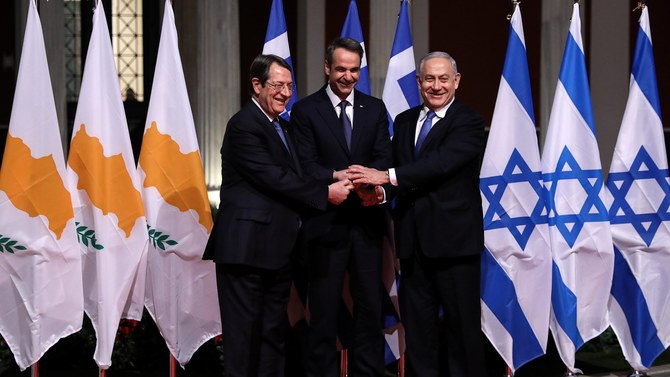Amid reports that the US has withdrawn its support for the EastMed pipeline due to economic and environmental concerns, Ankara is poised to bring alternative energy sources to the table.
The EastMed project, which was expected to be completed by 2025, aimed at diminishing Europe’s dependence on Russian gas by annually carrying 10 billion cubic meters of gas from Israeli and Cypriot waters into the European gas network through the 1,900-km-long pipeline
Turkey has long rejected the EastMed project, which has the support of Greece, Cyprus and Israel. The Trump administration also backed the pipeline.
During a visit to Albania on Jan. 18, Turkish President Recep Tayyip Erdogan told reporters that the project “cannot work without Turkey.”
“This project cannot happen. They (the US) carried out all the analyses, and they recognized that it had no positive sides. In other words, the cost calculations didn’t add up, so it pulled its support.”
Amid discussions of a possible official visit from Israeli President Isaac Herzog, Erdogan said on Tuesday that Turkey and Israel had previously tried to cooperate on energy resources but that relevant negotiations had been never pushed far.
“The US’s loss of interest in the EastMed pipeline is grounded principally on its shift of energy policy focus and secondarily on the multiple economic, geopolitical, technical and environmental challenges faced by the pipeline,” Madalina Sisu Vicari, an energy expert from the Eurasian Energy Chamber in Washington, told Arab News.
“When it comes the East Mediterranean region’s energy, the US’s interest is now primarily on electricity interconnectors that can support both gas and renewable energy sources, such as the EuroAsia interconnector linking the Israeli, Cypriot and European electricity grids, and the EuroAfrica subsea electricity interconnector linking Egypt to Crete and Greece,” she added.
According to Sisu Vicari, other players from the East Mediterranean region have begun fostering energy opportunities and projects beyond the field of natural gas, and these efforts could re-shape the region’s geopolitical environment.
“For instance, Egypt, Greece and Cyprus signed, in last October, two memoranda of cooperation on the interconnection for the transmission of electric power — one aiming to connect their electricity grids, another to link their power systems to Egypt’s via a subsea cable,” she said.
“The latter interconnector will transmit power produced by renewables in North Africa to Europe, the first such infrastructure in the East Mediterranean,” she said.
Sisu Vicari also noted that Washington’s shift of position on the EastMed pipeline might also determine mood swings from Israel, as the project is not compatible with the environmental goals declared by Israeli Prime Minister Naftali Bennett, who has pledged zero emissions by 2050.
Experts note that changing regional dynamics may open a window of opportunity for Turkey to boost energy cooperation with Israel.
As part of its efforts to mend ties with its former foes, Turkey has already signaled that it is prepared to carry the Israeli gas to Europe via its territories.
“We can sit down and discuss terms,” Erdogan said recently, adding that Turkey may use energy “as a tool for peace” if possible.
Sisu Vicari noted that whether such an energy deal would aim solely for the transportation of gas or encompass further areas of energy cooperation remains to be seen.
“But an energy agreement would have important geopolitical implications not only for the bilateral relations between Turkey and Israel, but for the whole East Mediterranean region as well,” she said.
Aydin Sezer, an Ankara-based energy expert, said it would not be feasible to launch a new pipeline if the authorities ever decide to initiate a joint project to carry gas to Europe through Turkish territories.
“An Arab gas pipeline, a trans-regional gas pipeline meant to transfer natural gas, is already there. That pipeline, which will carry Egyptian natural gas to Europe by passing through Lebanon, Jordan, Syria and Lebanon, is expected to be connected to Turkey when the Syrian grid is fully constructed and when the Homs-Aleppo segment is completed,” he told Arab News.
The first segment of the Syria-Turkey connection of the Arab Gas Pipeline between Aleppo and the Turkish border town of Kilis has been already constructed.
But on the other hand, Turkish and Israeli energy ministers held intense negotiations in 2017 when the construction of a proposed pipeline between Turkey and Israel was on the table.
“It was expected to be a 500-km-long pipeline and would pass through maritime zones of Cyprus or Syria or both for carrying gas from Leviathan to Europe via Turkish territories,” Sezer said.
“Beyond its international maritime law aspects, Turkish companies found this project too costly and not financially feas

